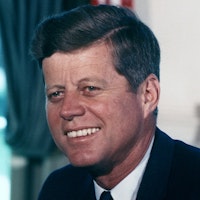With a good conscience our only sure reward, with history the final judge of our deeds, let us go forth to lead the land we love, asking His blessing and His help, but knowing that here on earth God’s work must truly be our own.
John F. Kennedy

Let Us Go Forth
Topic: Society & Civil Religion
“Finally, whether you are citizens of America or of the world, ask of us the same high standards of strength and sacrifice that we shall ask of you. With a good conscience our only sure reward, with history the final judge of our deeds, let us go forth to lead the land we love, asking His blessing and His help, but knowing that here on earth God’s work must truly be our own.“
John Fitzgerald Kennedy (May 29, 1917 – November 22, 1963), often known as JFK, was the 35th President of the United States, serving from January 1961 until his assassination in November 1963. A member of the influential Kennedy family, JFK left an indelible mark on American politics with his charismatic leadership, inspiring speeches, and pioneering efforts in civil rights and space exploration. His life was characterized by personal courage, political ambition, and a relentless commitment to public service. Despite his tragically abbreviated term in office, Kennedy’s legacy continues to shape modern American political discourse and policy.
Born on May 29, 1917, in Brookline, Massachusetts, Kennedy was the second of nine children in a wealthy and politically connected Irish-American family. He studied at Harvard University and served in the U.S. Navy during World War II, where his heroic actions following the sinking of his patrol torpedo boat earned him the Navy and Marine Corps Medal. After the war, Kennedy entered politics, serving in the U.S. House of Representatives and Senate for the state of Massachusetts. His charisma and dynamic speeches quickly marked him as a rising star in the Democratic Party, culminating in his narrow but momentous victory over Richard Nixon in the 1960 presidential election.
As president, Kennedy faced numerous challenges both at home and abroad. Internationally, his administration dealt with the Bay of Pigs Invasion, the Cuban Missile Crisis, the building of the Berlin Wall, and the early stages of the Vietnam War. On the home front, he proposed sweeping civil rights legislation and launched the ambitious Apollo program, which would eventually land a man on the moon. However, his promising second term was cut short when he was assassinated on November 22, 1963, in Dallas, Texas. Kennedy's death was a shocking event that stunned the nation and the world, but his enduring influence on American society and politics remains significant. His idealistic vision for America, encapsulated in his call to "ask not what your country can do for you - ask what you can do for your country," continues to inspire and motivate generations.
Inaugural Address
Bellah, Robert N. “Civil Religion in America.” Daedalus, vol. 134, no. 4, 2005, pp. 40–55., doi:10.1162/001152605774431464, p. 40 [John F. Kennedy, Inaugural address, January 20, 1961].

John F. Kennedy
Theme: A Vision of America
Resources
Copyright © 2017 – 2024 LuminaryQuotes.com About Us

John F. Kennedy, Inaugural address
The whole address can be understood as only the most recent statement of a theme [the civil religious tradition] that lies very deep in the American tradition, namely the obligation, both collective and individual, to carry out God’s will on earth. This was the motivating spirit of those who founded America, and it has been present in every generation since. Just below the surface throughout Kennedy’s inaugural address, it becomes explicit in the closing statement that God’s work must be our own.
–Robert N. Bellah [Reprinted by permission of Dædalus, Journal of the American Academy of Arts and Sciences, from the issue entitled, “Religion in America,” Winter 1967, Vol. 96, No. 1, pp. 1-21].